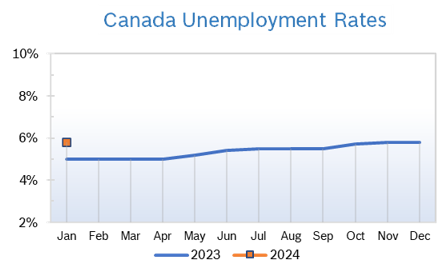|
Unemployment Steady at 5.8%
Consumer Prices Rise 3.4% Consumer prices rose 3.4% year over year in December after rising 3.1% year over year in November. It was the third consecutive monthly increase in consumer prices. Core CPI slowed year over year, from 3.6% in November to 3.5% in December, according to Statistics Canada. On a monthly basis, consumer prices fell 0.3% in December after rising 0.1% in November. Inflation averaged 3.9% in 2023, a big drop from the 40-year high of 6.8% reached in 2022. Excluding 2022, the annual average increase in 2023 was the largest since 1991. Excluding energy, the annual average CPI rose 4.5% in 2023 compared with 5.7% in 2022. However, various core measures continue to moderate, a sign that inflation is slowing. Increases in the price of services pushed up the overall index, with rents up 7.4% year over year. The BoC stressed that there has not been enough progress for them to consider cutting rates anytime soon. Housing and Construction News Housing starts rose 18% in December to 249,255 units compared with November, pushed higher by an increase in multi-unit urban starts in Vancouver and Montreal, according to Canada Mortgage and Housing Corp. (CMHC). Single-detached urban starts fell 2% to 43,242.The annual pace of rural starts was estimated at 14,550 for December. The six-month moving average of the monthly seasonally adjusted annual rate of housing starts in December was 249,898, down 2.1% from November. For the full year of 2023 Canadian home starts fell 7% to 223,513 annual units. Many buyers continue to sit on the sidelines waiting for interest rates to drop. Urban housing starts fell 7% to 223,513 and single-detached home starts fell 25% last year. Canadian home sales jumped 8.7% in December after falling 0.9% in November, according to the Canada Real Estate Association (CREA). It was the first monthly increase in seven months. CREA said 443,511 Canadian homes were sold in 2023, down 11% from 2022 and similar to sales after the 2007 housing crash and global recession. Home prices excluding Toronto and Vancouver dropped 0.8% from November to $730,400 in December, the fourth consecutive month of declines. Compared with December 2022 the home price index was up 0.8%. New listings fell 5% from November to December to the lowest level since June, when the Bank of Canada shocked the housing market with another interest-rate hike. CREA predicted that the average home price will increase 2.3% in 2024, with stronger gains in Alberta, Quebec, New Brunswick, Nova Scotia, Newfoundland and Labrador. The association said prices would remain flat in Ontario, the country's largest real estate market, as well as in British Columbia. According to the Canadian Home Builders' Association, 65% of builders said sales traffic was weak in the fourth quarter, and 5% reported deteriorating sales in the three-month period. Nearly two-thirds of respondents, 64%, said they built fewer homes in 2023 due to the high interest-rate environment. About 40% of builders said they expect to have the same number of starts in 2024 as last year, while 36% expect fewer projects. GDP Grows 0.2% GDP grew 0.2% in November after remaining essentially unchanged for three consecutive months. The majority of the growth in November came from goods-producing industries (+0.6%), which saw the highest growth rate since January 2023, with gains driven by increases in all but one sector. Services-producing industries edged up 0.1% in November 2023 despite the impact of the strikes in the Quebec public sector that began in the month. Overall, 13 of 20 industrial sectors increased in November. Bank of Canada Holds Rates Steady The Bank of Canada (BoC) held interest rates steady at 5.0% in January for the fourth consecutive time, as inflation remains higher than their target of 2% and economic growth has not slowed enough to warrant a rate cut. While the BoC refused to rule out a future rate cut if needed, economists expect the BoC to begin cutting rates later this year. Total CPI inflation stood at 3.4% in December, with shelter costs the biggest contributor to above-target inflation. Consumer Prices Fall 0.3% On a monthly basis, the CPI fell 0.3% in December, after rising 0.1% gain in November. Consumer prices were up 3.4% year over year in December after being up 3.1% in November. Retail Sales Rise 0.7% Retail sales fell 0.2% to $66.6 billion in November. Sales were down in four of nine subsectors and were led by decreases at food and beverage retailers (-1.4%). Core retail sales, which exclude gasoline stations and fuel vendors and motor vehicle and parts dealers, were down 0.6% in November. In volume terms, retail sales decreased 0.2% in November. Core retail sales decreased in five provinces, but rose in British Columbia. Retail Ecommerce Sales Fall 1.5% On a seasonally adjusted basis, retail ecommerce sales were down 1.5% to $3.9 billion in November, accounting for 5.8% of total retail trade, compared with 5.9% in October. Retail Notes Canadian Tire has hit the brakes on the ambitious plans they announced in 2022 that was designed to increase sales by $3.4 billion across all their stores by the end of 2025. They indicated they will not meet the target and will delay spending on low-priority investments while they deal with severe economic headwinds. In the first nine months of this fiscal year, total revenue fell by 2.1% to $12.2-billion. They made a wide range of Investments, including thousands of new product launches under the stores' owned brands, upgrades to physical stores and digital operations, construction of new warehouse space and expansion of the Triangle loyalty program. © Robert Bosch Tool Corporation. All rights reserved, no copying or reproducing is permitted without prior written approval.
Comments are closed.
|
Archives
July 2024
|








